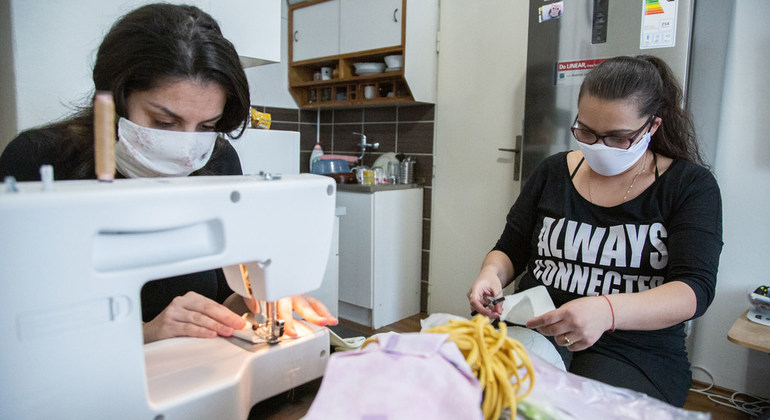“They said the face masks were desperately needed, and I did not hesitate, says Klara Pulova, from Tanvald, a small town in the north of the country. I have been a sewing professional in the past, I know the job.”
They said the face masks were desperately needed, and I did not hesitate. Klara Pulova, member of Czech Roma community, Tanvald
Ms. Pulova is a member of the region’s Roma community, and was responding to a widespread shortage of face masks, sorely needed in the country: as part of its emergency response to the COVID-19 pandemic, the government made the wearing of face masks mandatory on 19 March.
However, it soon became clear that there were not enough masks for essential workers, such as health professionals, the police, and the fire brigade. Within 24 hours, a grassroots initiative, the “face mask movement”, sprang up, with people dusting off old sewing machines and putting them to use, spurred on by social media groups and websites.
In Tanvald, Ms. Pulova’s former colleagues provided her with a sewing machine, and friends and other people provided the material: although non-essential shops had been ordered to close as part of the government shutdown, an exception was soon made for stores selling materials needed for textile face masks.
The vital contribution of refugees and migrants
The face mask issue has helped to unite Czech society, with many different kinds of people contributing to the cause. Materials have been shared, some companies have made old stock available, and the movement has given many members of the population an opportunity to become directly involved in fighting the spread of the virus.
The Roma community is not the only Czech minority group taking up the challenge. Refugees, migrants and minorities have also been mobilizing to help out. For example, the Vietnamese community set up an account that its members could contribute to, which is being used to fund the production of single-use protective masks, that are being delivered to hospitals and care homes for the elderly.
Celebrities including actors, artists, singers and elite athletes can be seen sewing masks online, and many politicians and experts have worn home-made masks on TV.
“We see a number of fascinating stories emerging from marginalized groups, as well as celebrities, united for one goal: to help stop the pandemic”, says Lukáš Houdek, Coordinator of the Hatefree.cz project, that works for minority integration and documents their issues and stories. “Let’s hope we retain that spirit beyond the crisis“ .
Cohesion and unity amongst Czech communities
The current official guidance from the World Health Organization (WHO), concerning the use of face masks, is that healthy people should only use them if they are taking care of someone who is suspected of being infected with COVID-19.
“Wearing face masks at all times by people without symptoms is not a policy recommended by the WHO”, said Doctor Srdan Matić, WHO Representative in the Czech Republic. “However, the social benefits of the face mask movement, and its impact on cohesion and unity among people of different communities, including Roma, migrant, Muslim or Vietnamese, are to be welcomed”.
Back in Tanvald, Ms. Pulova and her friend Renata Fecova have already made 1,000 masks. Their example continues to be followed across the country, with hundreds of thousands of home-made face masks being produced, and made available in public spaces for those essential workers who continue to serve the public, including shop assistants, social workers, carers and medical professionals.




